Indonesia is the only Asian country which officially
promised to sign the UN Convention for the Protection of All Persons from
Enforced Disappearance at a High level session of the UN Human Rights
Council in 2007. The same promise was reiterated during the AFAD-FEDEFAM
joint lobbying conducted in different government agencies including the
Ministry of Justice and the Ministry of Foreign Affairs in September 2007.
A year later, families of the disappeared in Indonesia, in their life of
pain, of struggle and of hope to realize a world without desaparecidos,
continue the cry for truth and justice…. and for the adoption of the UN
Convention for the Protection of All Persons from Enforced Disappearance.
Moments with a Father of a Disappeared
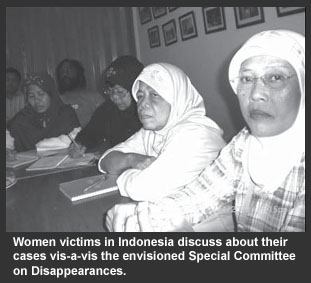 I am
grateful of the opportunity to have met several family members of the
disappeared on the occasion of the week-long commemoration of the 10th
anniversary of Ikatan Keluarga Orang Hilang Indonesia (IKOHI) or
Association of Families of the Disappeared in Indonesia held during the
third week of November 2008.
I am
grateful of the opportunity to have met several family members of the
disappeared on the occasion of the week-long commemoration of the 10th
anniversary of Ikatan Keluarga Orang Hilang Indonesia (IKOHI) or
Association of Families of the Disappeared in Indonesia held during the
third week of November 2008.
I took special notice of Mr. Utomo, father of
disappeared person, Petrus Bima Anugrah, as he reminded me that we had met
at the end of September 1998 during an Inter-Continental Forum on Enforced
Disappearances wherein he personally submitted his case to the UN Working
Group on Enforced or Involuntary Disappearances (UNWGEID). He is one of
these many family members working and waiting for truth and justice.
A student activist, Petros was involved in an
organization labeled as communist. Before his disappearance, he was caught
by the police for distributing leaflets for an election campaign against
the government. The police detained him for two months and released him on
the condition that he had to regularly report to the former. Days after,
policemen came to Utomo’s house to look for Petros who was accused of
being affiliated with the People’s Democratic Party condemned as communist
by the government. The police asked questions and forced Utomo to tell the
truth on the whereabouts of his son, but he himself did not know where
Petros was.
“ I really did not know before if they kidnapped my son
because Mugiyanto said that they never met him in detention. When the
officer came to the house, I did not know where my son was. The last time
I met him was towards the end of 1997. It was only on 31 March 1998 that
Bimo, Petros’ friend, came to my house and asked my family where Petros
was. It was the first time that I was convinced that my son was missing.
Until now, he is still missing and hopefully still alive.”
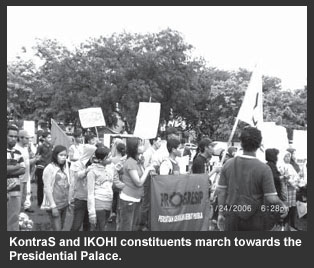 Utomo
sought the help of various organizations such as KontraS, Legal Aid
Foundation (YLBHI), the Police, the Department of Law and Human
Rights, the Commission on Human Rights (Komnas Ham), the
International Committee of the Red Cross and even the Parliament. While
most of these organizations and agencies helped him, Utomo bitterly
complained that the Parliament wanted to meet only 15 out of 30 family
members of the disappeared. No meeting was realized because the 30 family
members did not want to have a meeting if only half of them were allowed
to join. Finally, he along with other victims, KontraS and Legal
Aid Foundation representatives, met the Parliamentarians in 2002. Of the
three persons they met, only one person from the Parliament spoke but the
others slept during the meeting, Utomo clearly recalled.
Utomo
sought the help of various organizations such as KontraS, Legal Aid
Foundation (YLBHI), the Police, the Department of Law and Human
Rights, the Commission on Human Rights (Komnas Ham), the
International Committee of the Red Cross and even the Parliament. While
most of these organizations and agencies helped him, Utomo bitterly
complained that the Parliament wanted to meet only 15 out of 30 family
members of the disappeared. No meeting was realized because the 30 family
members did not want to have a meeting if only half of them were allowed
to join. Finally, he along with other victims, KontraS and Legal
Aid Foundation representatives, met the Parliamentarians in 2002. Of the
three persons they met, only one person from the Parliament spoke but the
others slept during the meeting, Utomo clearly recalled.
At the peak of the narration of his story, filled with
emotion, Utomo suddenly blurted: “The president is a liar! He lies to the
victims’ families. What can we expect from this government? “
A decade ago, Utomo appealed to the Chair of UNWGEID to
visit his country. He still remembered how he was told that it must be the
government of Indonesia which would invite the UN WGEID to visit the
country. A decade later, despite Utomo’s request for an invitation from
the government, the latter responded that the visit be postponed. Such a
postponement, however, is indefinite. Utomo, at the time of my
conversation with him, was drafting a letter of appeal to the UNWGEID to
help him find his disappeared son.
In the most recent meeting with some members of the
Indonesian Parliament, Utomo reiterated the same story and said to the
lawmakers: “ If you yourselves are fathers who have sons and have taken
care of them and have brought them to school, you should understand me.
Please help us.”
Faces of Pain, of Courage, of Hope…
Utomo is only one of the many families of the
disappeared in the world’s fourth most populous country to have
persistently searched for their disappeared loved ones – sons, daughters,
brothers, sisters, who disappeared at certain dark moments of the
country’s history during the 1965 annihilation of the Communist Party of
Indonesia (PKI) and the 1998 riot following the fall of the 32
years of Suharto dictatorship. A decade ago, they formed themselves into
an organization, Ikatan Keluarga Orang Hilang Indonesia (IKOHI) or
Association of Family Members of the Disappeared in Indonesia. The
formation of the organization is a recognition of the inherent power of
the families of the disappeared in elevating their personal crusade of
finding their disappeared loved ones to a national struggle in the fight
against this scourge as well as the fight against impunity.
Many faces of pain and courage are women, most of whom
are wearing veils and long dresses. These women are either survivors of
the 1965 massacre or mothers, wives, sisters, daughters of
desaparecidos. In a meeting with some of the members of the Indonesian
Parliament, they took turns retelling their stories.
Toti Koto, who calls herself Mommy, exemplifies a woman
of grace, yet possessing strong character capable of scolding the National
Commission on Human Rights (Komnas HAM) for failing to fulfill its
promise of facilitating the resolution of the disappearance of her son.
With confidence, she said that 9 other victims have recognized Rian, who
is no other than her son, Yani Afri. With faltering voice and teary eyes,
she bitterly exclaimed: “The government does not want justice for me. Life
or death is my son’s destiny. I do not want this to happen again to the
children of today and of tomorrow. If you tell the president, he
understands this case. However, the problem with him is he just makes
promises. He just lies to us!”
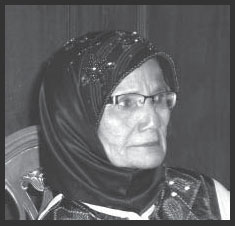 Bufata
in a meeting with the Parliament said that her disappeared son was a
street child who struggled for a better life for his family. This mother
found it totally incomprehensible how could her child, who sacrificed
himself and earned money at such a young age, be made to disappear? In a
message to the president, through the Parliament, she said: “ Will I just
keep silent? I hope that this message can open your heart, Mr. President.”
Bufata
in a meeting with the Parliament said that her disappeared son was a
street child who struggled for a better life for his family. This mother
found it totally incomprehensible how could her child, who sacrificed
himself and earned money at such a young age, be made to disappear? In a
message to the president, through the Parliament, she said: “ Will I just
keep silent? I hope that this message can open your heart, Mr. President.”
Nurhasana introduced herself as the mother of Yadi
Mohidir who disappeared during the May riot in Tanjung Priok. When asked
of her son’s whereabouts, the police wryly said that her son was already
released. Searching for him in every nook and cranny of the country,
meeting government authorities including no less than the president of the
land, she only received the same unfulfilled promise that the case would
be investigated. Sobbing, she pleaded to the members of the Parliament to
find her son.
Rumina, mother of disappeared son Gunawan said that her
son went out in the afternoon and never returned. She recalled that on the
day when her son disappeared, she saw a truck loaded with children but she
was not aware if her son was there. She approached the police but was told
to go to a hospital full of dead bodies. Heaving a sigh of desperation,
she said that when her son left, he was in a good shape, but not knowing
where he was caused her many sleepless nights. She joined IKOHI and
KontraS to search everywhere for her son, but the government has
given no hint about the disappearance.
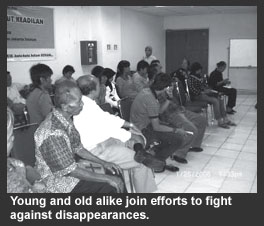 These
victims of the 1998 riot in the context of the fall of dictator Suharto
spoke of the families’ dilemma about a Special Committee on Enforced
Disappearances which the government would establish. While families of the
disappeared expressed their fear that it would just be used by politicians
to serve their own interests, they wanted to be optimistic by resolving to
cooperate with it while maintaining vigilance.
These
victims of the 1998 riot in the context of the fall of dictator Suharto
spoke of the families’ dilemma about a Special Committee on Enforced
Disappearances which the government would establish. While families of the
disappeared expressed their fear that it would just be used by politicians
to serve their own interests, they wanted to be optimistic by resolving to
cooperate with it while maintaining vigilance.
Wrinkled faced Sri Sulishyowati, a former journalist,
is a survivor of the 1965 massacre. A witness to the brutalities of her
times, she expressed her impatience that after more than 43 years, no
justice has been meted out to her and her colleagues after years of
illegal detention and torture. In a forum on the UN Convention for the
Protection of All Persons from Enforced Disappearance, she called on the
Indonesian government to fulfill without further delay its promise to sign
and ratify the UN Convention for the Protection of All Persons from
Enforced Disappearance.
A number of the victims of the 1965 massacre, which
annihilated the Communist Party of Indonesia or the Partai Komunis
Indonesia (PKI), persevere in their fight yet their number is
diminishing and certainly, those who have already died never witnessed the
dawn of truth and justice which took them a lifetime to dream about and
struggle for. The remaining survivors, while still alive, continue to work
and hope against hope for the dawning of a new day wherein all their tears
will be wiped away and all their struggles will be laid to rest.
A Decade of Journey Towards A World Without Desaparecidos
A decade ago, IKOHI was formed in recognition of
the inherent strength of the families of the victims who are in the best
position to struggle for truth, justice, redress and the reconstruction of
the historical memory of the disappeared. On 17 September 2008, IKOHI
turned 10 years old. Through the years, the families of the victims have
transformed themselves from victims to human rights defenders.
In a week-long commemoration of their anniversary held
a month later, they conducted multiple activities. These are as follows:
-
9 November 2008 - The first event was an initiative to
convene high school students who committed themselves to serve as a
support group of the families of the disappeared. The initiative is a
recognition of the role of the youth, being a vital part of society, in
the struggle against enforced disappearances.
-
10 November 2008 – more than twenty family members of
the disappeared and victims of the extrajudicial execution in 1965 and
2008 respectively discussed the unresolved cases and were inspired by
success stories in Argentina and Morocco.
After the meeting, the families of the victims proceeded to the
presidential palace amidst pouring rain. Speakers took turns in presenting
their agenda on the unresolved cases of the past and the government’s
utter failure to address their concerns. The event was culminated by a
drama depicting perpetrators violently arresting their captives and
pointing guns at the innocent victims.
-
11-12 November – A psycho-social rehabilitation session
supported by AFAD was conducted in response to the profound trauma of the
families of the victims and the need to further foster solidarity among
them, thus strengthen unity in their common struggle for justice and
against impunity.
-
11 November – KontraS, IKOHI and AFAD
held a meeting with the Commission on Human Rights of Indonesia (KOMNAS
HAM) to bring up individual cases. Three mothers of the disappeared,
with admirable fortitude, reiterated their stories to the Commission and
bluntly said that they did not want to listen and wait for empty promises.
The Vice Chairperson of the Commission, M. Ridha Saleh said that he had
written letters to President Sucilo Bambang Yudhoyono …. and would write
another one very soon. Mugiyanto and this author reminded the Commission
that the government of Indonesia has not yet fulfilled the promise of the
government to sign the UN Convention for the Protection of All Persons
from Enforced
Disappearance.
-
12 November – About twenty family members of the
disappeared spoke to some members of the House of Parliament about their
cases and their dilemma as well as their hope for the establishment of a
Special Committee on Enforced Disappearances.
-
13 November – a trial on the case of Munir which, to
date, has not yet fully been resolved, took place in one of the local
courts of Jakarta. General Muchdi, who was present as a witness, confirmed
that high officials of the Indonesian Intelligence Group or the Badan
Inteligen Indonesia (BIN) were involved in the assassination of KontraS
and IKOHI founder and AFAD Chairperson, Munir. Suciwati, Munir’s
widow, who was present, hoped as she always does and will always do that
there would eventually be some light at the end of the tunnel.
Several other activities were held on the same day,
such as the following:
• There was a program at the Catholic University of Indonesia where, ten
years ago, some students were massacred by the military. Some of those who
survived exhibited photos of the incident and offered a tribute to those
who had fallen at the hands of the Indonesian Military.
• At 4 p.m., in front of the Presidential Palace, a silent rally was
conducted by families of the disappeared wearing black t-shirts and
carrying black umbrellas. Inspired by the Thursday rallies of the Madres
de Plaza de Mayo of Argentina, it is held every Thursday.
• Family members and survivors of the 1965 massacre visited cemeteries in
various points of the country to honor their fallen heroes and martyrs.
-
14 November 2008 saw a public discussion about the
massacre and disappearances that occurred in 1965 followed by a public
forum on the UN Convention for the Protection of All Persons from Enforced
Disappearance. The forum on enforced disappearances, sponsored by AFAD and
cosponsored by IKOHI and KontraS, culminated with a
presentation of a letter (signed by IKOHI, AFAD, FEDEFAM in
the name of the International Coalition Against Enforced Disappearances)
to a representative of the Department of Law and Human Rights.
The night of nights culminating the week-long commemoration came. It was
an event brimming with solidarity and commitment, meaningfully celebrated
through cultural presentations in forms of dancing, singing, poetry and
drama as well as film showing. It capsulized IKOHI’s ten years of
trials, tribulations and triumphs as it continues to tread the road less
travelled in this fight against impunity.
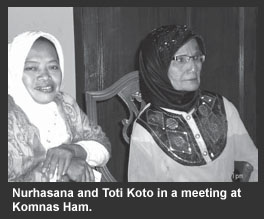
Until Victory...
The week-long IKOHI anniversary commemoration speaks of the
strength of the organization of families of the disappeared. Exhausting,
indeed were the activities, yet full of life. Humbly speaking, the
activities were not bereft of human frailty but what is important is the
ability to learn lessons from past experiences, harness skills in
organizing the families of the victims, helping each other overcome the
trauma brought about by enforced disappearance, thus forging on with the
task of empowerment towards the long-cherished vision of a world without
desaparecidos. Empowering the families of the disappeared to
facilitate their maximum participation to the human rights cause will in
no small measure, contribute to the democratization of Indonesia in this
post Suharto area.
IKOHI’s 10th aniversary was a celebration of
life and a recognition that the struggle is far from over. Long is the
road to victory as reflected from narratives of family members of the
disappeared and the government’s apathy. The answers to this seemingly
unreachable victory are persistence and courage. Such persistence and
courage continue to flourish out of the family members’ deep love for
their beloved desaparecidos. Utomo, Toti Koto, Bufata, Nurhasana,
Rumina, Sri and innumerable other families of the disappeared, inspired by
their beloved desaparecidos and guided by the undying spirit of
Munir dare say: Till victory…. Hasta la victoria……
And the journey goes on….